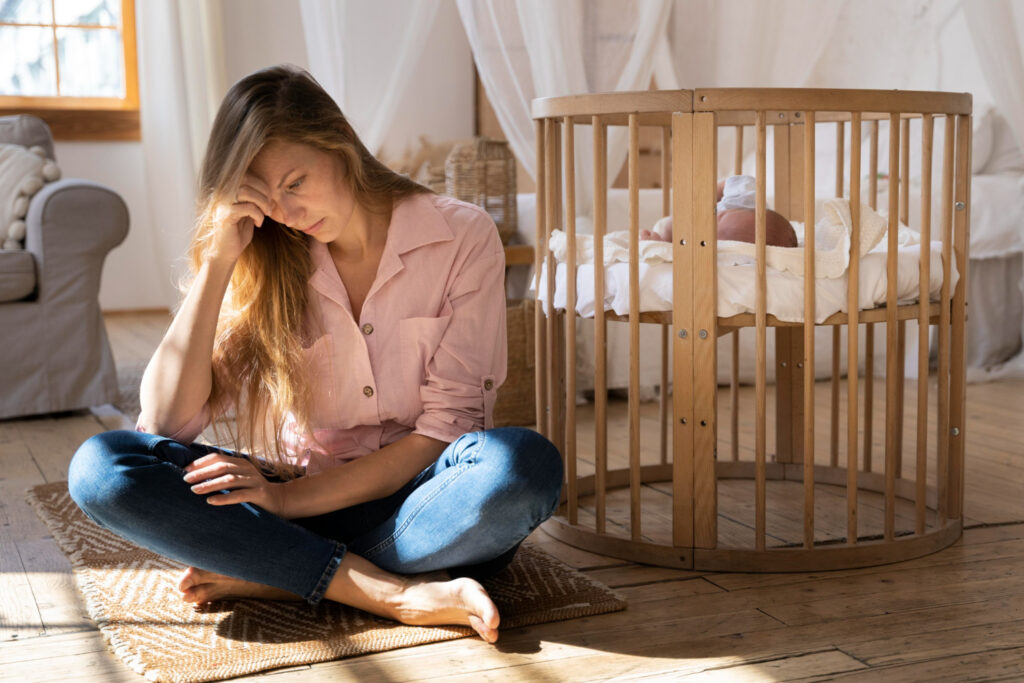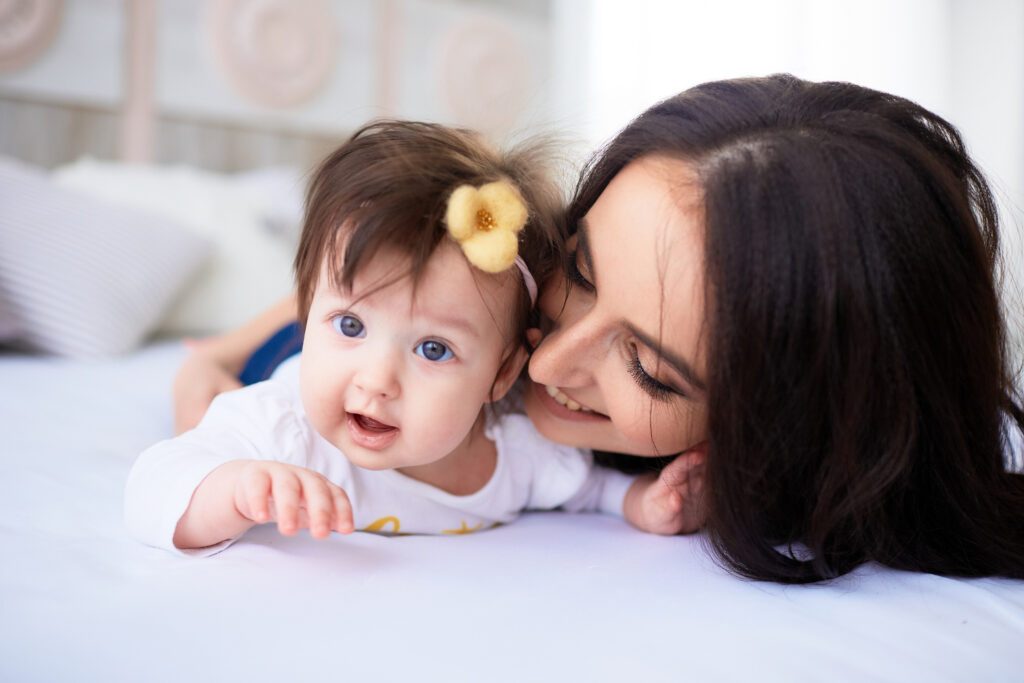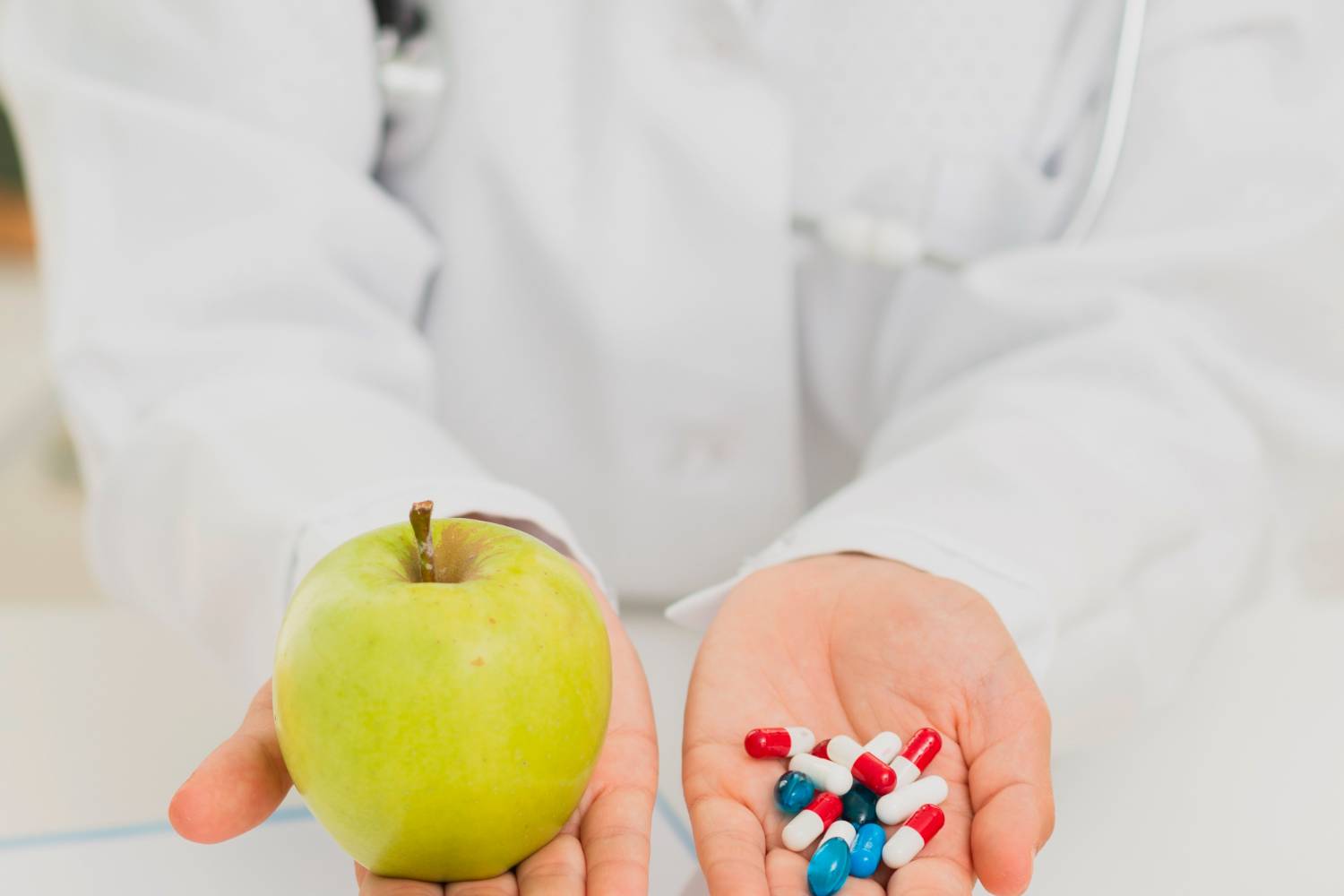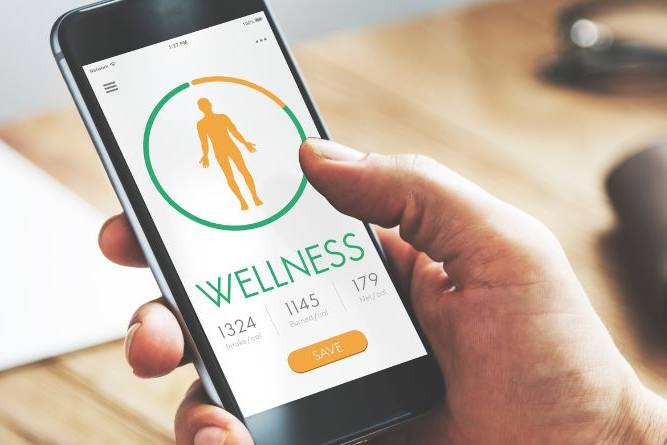Over the last 14 years of working with people—women, families, new parents—one thing has stood out to me time and again:
- Many women realize months or even years later that what they were experiencing after childbirth wasn’t just exhaustion or the ‘usual motherhood chaos’—it was postpartum depression.
I’ve had countless clients come up to me and say, “Luke, I had no idea what I was going through until I read something or heard someone speak about it. It’s like a lightbulb went off—and I realized that’s what I went through.”

Around 80% of women experience something called postpartum blues—emotional shifts, mild anxiety, or sadness in the first week or two after delivery. But when those symptoms linger, intensify, or interfere with your ability to care for yourself or your baby—it could be postpartum depression.
And this isn’t rare. Postpartum depression in India is increasingly being recognized as a silent epidemic. One major postpartum depression reason is the lack of awareness, emotional support, and preparedness around this phase of motherhood.
If you’re a mother silently struggling, questioning your emotions, or feeling like you’re losing a part of yourself—you’re not broken. You’re human. And more importantly—you can heal.
This one’s for YOU! It’s built on what I’ve learned over the years, backed by lifestyle medicine, functional healing, and insights from my conversation with Dr. Judith Joseph, social media’s favorite psychiatrist.
What is Postpartum Depression? More Than Just the ‘Baby Blues’
You know, it’s completely normal to feel a little off after childbirth. You’ve just been through a massive physical, emotional, and hormonal shift.
Many new moms feel emotional, teary, anxious, or overwhelmed in the first few days—that’s what we often refer to as the baby blues. And in most cases, that settles down within a couple of weeks.
But postpartum depression is different. It’s deeper. It lingers. It starts to affect the way you live, love, think, and function.
In fact, one of the most eye-opening things that came up in my podcast with Dr. Judith Joseph is this:
- Many women only realize months—or even years—later that what they went through wasn’t just the stress of being a new mom. It was postpartum depression, and they didn’t have the awareness to label it back then.
So what really sets postpartum depression apart from the baby blues?
Baby Blues vs. Postpartum Depression: The Key Differences
Baby blues typically start a few days after delivery and go away on their own within one to two weeks.
Postpartum depression, on the other hand, lasts longer, can start anytime within the first year, and doesn’t go away without support or intervention.
Here are some of the signs to look out for:
- Ongoing sadness or frequent crying spells
- Feeling irritated or angry over small things
- Exhaustion that doesn’t improve with rest
- Trouble sleeping even when the baby is asleep
- Loss of appetite—or emotional eating
- Withdrawal from loved ones
- Feeling disconnected from your baby
- Thoughts like “I’m not a good mother” or “My baby would be better off without me”
- Loss of interest or pleasure in things you used to enjoy (anhedonia)
- And in rare but extreme cases, postpartum psychosis, which may include hallucinations or delusions

Now here’s something important I always remind my clients—just because your symptoms aren’t severe doesn’t mean they’re not valid. You don’t need to hit ‘rock bottom’ to seek help.
Postpartum Depression in India – A Hidden Crisis
We don’t speak about it enough. And even when we do, we tend to dismiss it as just ‘adjusting to motherhood’ or being ‘too emotional.’
- But here’s the reality: around 22% of new mothers in India are believed to suffer from postpartum depression. That’s roughly 1 in 5 women—and that’s just the reported number. (Source: Shraddha Lanjewar, Shilpa Nimkar, et al. Depressed Motherhood: Prevalence and Covariates of Maternal Postpartum Depression among Urban Mothers in India, Asian Journal of Psychiatry, Volume 57, 2021, 102567, ISSN 1876-2018, https://doi.org/10.1016/j.ajp.2021.102567.)
So, why this silence?
- Lack of awareness: Most women—and even their families—don’t know what postpartum depression looks or feels like. They think emotional breakdowns or numbness are just ‘part of motherhood.’
- Cultural pressure to bounce back: In many Indian homes, the new mother is expected to resume her duties almost immediately. Be the smiling, glowing, strong mom who has it all together.
- Stigma: Mental health is still taboo in many Indian households. Seeking help is seen as weakness—or worse, shameful.
- Limited support systems: Many women don’t get emotional or physical help from partners, in-laws, or families. Some are isolated in nuclear families, and others feel invisible in joint ones.
- Medical oversight: Postnatal care often focuses only on the baby. Very few doctors or gynecologists ask the mother how she’s feeling emotionally.
And when there’s no space to talk, to cry, to be vulnerable—postpartum depression turns into a silent, invisible wound that keeps growing.
Common Postpartum Depression Reasons: What Really Causes It?
Postpartum depression reasons are complex, layered, and deeply human. Let’s unpack them together.
Biological Reasons:
One of the biggest postpartum depression reasons and biological triggers is the sharp drop in estrogen and progesterone after childbirth. Your body goes from being hormonally elevated during pregnancy to a sudden crash postpartum—and that shift can hit hard.
Add to that:
- Thyroid hormone imbalances (often missed)
- Nutrient deficiencies—especially Vitamin D3, B12, and iron
- Gut imbalances affecting mood-regulating neurotransmitters like serotonin
For many women, these biological factors quietly create the perfect storm, and no one even checks for them during routine postnatal visits.
Physical Triggers
Let’s not underestimate the toll childbirth takes on the body. Whether it was a natural birth, C-section, or traumatic delivery, your body is in recovery mode.
Now combine that with:
- Chronic sleep deprivation
- Breastfeeding difficulties or pain
- Physical discomfort and fatigue that’s brushed aside as ‘normal motherhood’
It’s a lot. And when your body is tired, healing, and hormonally imbalanced, your mind takes a hit too.
Emotional Triggers
I often hear moms say, “I love my baby, but I don’t feel like myself anymore.” Or, “Why am I not happier?”
These emotional experiences are real:
- Fear of not being a ‘good enough’ mother
- Disappointment when motherhood isn’t what you expected
- Guilt for not being constantly joyful
- Feeling emotionally disconnected from your partner, or even your baby
And let’s not forget—if you already had anxiety or depression before pregnancy, your risk of postpartum depression increases.
Social Pressures
The lack of real, consistent support is one of the biggest postpartum depression reasons I see today.
Whether it’s:
- A partner who doesn’t know how to help
- In-laws who expect too much too soon
- The invisible load of doing everything without being asked how you’re doing
- Or scrolling through social media, comparing your messy day to another mom’s perfect highlight reel
Social stress plays a huge role. And when it builds up without release, it weighs heavily on the mind and body.

A Holistic Approach to Postpartum Depression: Lifestyle Medicine Matters
Healing from postpartum depression isn’t just about a pill or a diagnosis. Sometimes, it starts with a warm meal. A real conversation. A ten-minute walk. A moment of silence.
As Dr. Judith Joseph beautifully shared in our podcast—therapy, medication, and lifestyle all have their place. But too often, we skip the foundational pieces: sleep, food, support, and connection.
Let’s talk about a lifestyle-first approach to managing and even preventing postpartum depression.
1. Plan Before the Baby Arrives
Don’t wait for the breakdown. Plan ahead. If you’ve had anxiety or depression in the past, set up therapy during pregnancy.
Create a postpartum blueprint:
- Who will help when you need rest
- What will your meals look like?
- Where’s your emotional support coming from?
Planning isn’t paranoia—it’s preparation.
2. Prioritize Sleep and Nourishment
Let me say this clearly: Sleep is medicine. I know it’s hard. But even short, quality naps can regulate hormones, reduce inflammation, and reset your mood.
- Nap when the baby naps—even if it’s mid-day.
- Eat brain-nourishing foods like:
- Omega-3 rich seeds and walnuts
- Leafy greens and warm, iron-rich meals
- Foods high in magnesium, B12, and vitamin D3
- Drink more water. Cut down on caffeine and sugar.
The brain needs nutrients to make serotonin and dopamine—you can’t heal in an empty tank.
3. Move Gently, Breathe Deeply
Exercise doesn’t mean hitting the gym. It means connecting with your body again.
- A simple 10-minute walk with your baby in the stroller
- Gentle postnatal yoga or stretches
- Deep breathing, guided meditations, or even breathwork techniques from our other programs
Movement releases endorphins, improves sleep, and creates space between you and your thoughts.
4. Emotional Well-being
One of the biggest lessons I’ve learned is that emotional wellness isn’t one big breakthrough—it’s a series of small, daily choices.
- Journal your feelings without judgment
- Try Emotional Freedom Technique (EFT) tapping to calm the nervous system
- Use apps or podcasts for guided meditation
- Therapy, even once a week, can be a turning point
And if you’re not ready for therapy, start with support groups—many are online, free, and filled with women who understand.
5. Build Your Village
You weren’t meant to do this alone. And if your partner isn’t available or doesn’t understand what you’re going through—don’t isolate. Build your support system:
- Involve your mother, siblings, friends, or postpartum doulas
- Hire help if it’s financially possible—it’s not a luxury, it’s self-preservation
- Join support circles—online or in-person
As Dr. Judith said, some therapy centers allow moms to bring their babies—which helps both the mother and child bond, heal, and thrive together.
6. Spiritual & Social Connection
Sometimes healing doesn’t come through words—but through quiet, sacred rituals.
- A few moments of prayer or gratitude journaling
- Silence and self-compassion
- Sharing your truth with someone who will hold space without fixing you
- Join a community group or start a new hobby to meet like-minded people. If you are unable to find one, join Luke’s Wellness Tribe — Our community designed to help you heal, grow, and thrive—mind, body, and soul. .
Remember—healing isn’t about being perfect. It’s about being real.
When to Seek Help: Know the Signs
Over the years, I’ve met countless women who only realized months—or even years—later that what they went through was postpartum depression. If you’re feeling persistently sad, numb, disconnected, or overwhelmed, please know that this isn’t weakness, it’s a call for support.
If medication is needed, many options today are safe for breastfeeding.
If you feel you can’t care for yourself or your baby, or your emotions feel too heavy—reach out.

The Last Word
Postpartum depression isn’t your fault, and it doesn’t define your journey as a mother.
If you’re reading this and struggling—pause, breathe, and know you’re not alone.
And if you’re a loved one witnessing someone go through this, just ask, “How are you really feeling?” Sometimes, that’s all it takes to make someone feel seen.
Motherhood is not about perfection. It’s about connection and compassion—with your baby, your body, and most importantly, yourself.
Frequently Asked Questions
How do I know if it’s postpartum depression or just the baby blues?
Baby blues are short-lived—usually resolving within two weeks after childbirth—and include mild mood swings, tearfulness, and fatigue. But postpartum depression goes deeper and lasts longer. If you’re feeling persistently sad, anxious, irritable, or emotionally numb for weeks or months, and it’s affecting your daily life or bonding with your baby, it’s important to seek help. You are not alone.
What are the most common postpartum depression reasons?
Postpartum depression reasons are layered and often interconnected. Hormonal crashes after birth, nutritional deficiencies, poor sleep, emotional stress, breastfeeding difficulties, and a lack of support are common triggers. In India, societal pressures, unrealistic expectations, and the silence around maternal mental health make it worse. Recognizing these reasons is the first step toward healing.
Why is postpartum depression in India such a hidden issue?
Postpartum depression in India is often underdiagnosed due to stigma, lack of awareness, and cultural pressure on new mothers to ‘bounce back.’ Many women aren’t taught that their emotional well-being matters just as much as their baby’s. Without open conversations, women suffer in silence. This needs to change—support and education are crucial.
Can lifestyle changes really help in managing postpartum depression?
Yes, lifestyle matters—immensely. Nutrition, sleep, emotional support, daily movement, and spiritual grounding play a powerful role in postpartum healing. Therapy can be effective even without medication. Small, consistent changes like gentle yoga, journaling, omega-3-rich meals, and asking for help can rebuild emotional strength from within.
When should someone seek professional help for postpartum depression?
If you’re feeling persistently overwhelmed, disconnected from your baby, or experiencing dark or intrusive thoughts—please don’t wait. These are strong signs of postpartum depression and not something to ignore. Seeking therapy or coaching isn’t a sign of weakness—it’s strength. You deserve healing, support, and a safe space to feel better.
Disclaimer: This blog is for informational and educational purposes only and does not substitute professional medical advice, diagnosis, or treatment. If you are experiencing symptoms of postpartum depression or any mental health concerns, please consult a qualified healthcare provider or mental health professional.
Looking for holistic and integrative guidance on postpartum depression?
We help you find a way.
Set up a one-on-one consultation with our integrative team of head nutritionists or pregnancy/lactation care experts for personalized solutions.
Reach out to us at 1800 102 0253 or write to us at consults@lukecoutinho.com.

Team Luke
Start Your Wellness Journey
Feeling inspired to take the next step in your wellness journey? Connect with us to explore how our tailored programs can support your health journey. Your transformation is just a conversation away.



